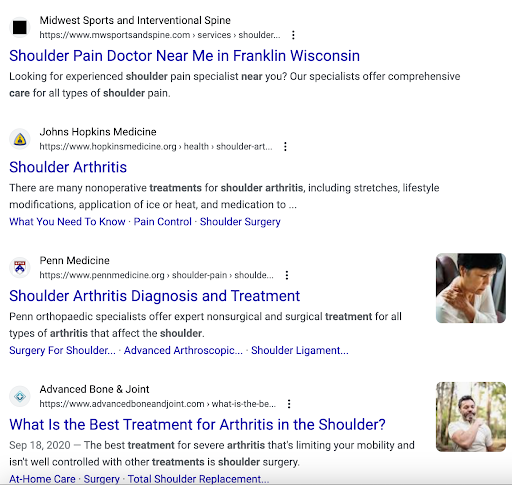An Example of How Healthcare SEO Works
Suppose there’s a person who just moved to your area who knows they need to establish with a new primary care provider. They might know who accepts their health insurance, but they’re looking for someone who can address their unique needs and isn’t too far from their new home.
If that person were to search for the term “primary care physician near me,” they would get something that looks a little like this:
These are the search results that appeared after the sponsored content and featured places that Google pulled for this location. Since up to 80% of people ignore paid search results, these will likely be the first results they look at.
These directory sites are also likely to bring in a lot of valuable organic traffic.
By offering this new mover information and options for different primary care physicians, these directories attract ideal customers to their websites. They do this by understanding user intent.
User intent indicates what a searcher online wants to find on the internet when they type their term into a search engine like Google.
In this case, the intent of someone searching for the term “primary care physician near me” is pretty clear. They need a list of different primary care physicians in their area, so those directories are likely to be helpful to them.
If you can understand and empathize with your target audience’s needs, you’ll be able to find more valuable keywords and create better content.

Why SEO for Healthcare?
People trust search engines to find answers and solutions to their problems. Even more, according to a Pew Research study, 66% of internet users look online for information about specific medical conditions or diseases. That includes people over age 65 who are more likely to need routine, unplanned, or elective medical care.
If you aren’t investing in search engine real estate, you may be missing out on traffic that can help you find more patients and grow your service lines even further.
Healthcare SEO Strategies
Developing an SEO strategy for your brand goes beyond just looking up keywords and pasting them onto your website. As an agency providing healthcare SEO services, we recommend following these guidelines to attract your most valuable potential patients.
Using Search Empathy to Understand Your Customers
We always tell our clients to focus on their customers first, whether they’re a healthcare organization, a nonprofit, or anything in between. To successfully execute digital marketing, you need to know more and care more for your customers than your competitors.
Creating content that addresses your customers’ needs means developing unique, engaging pieces that are designed to be helpful rather than focusing solely on your services or physicians. By understanding how your customers or patients think, what their pain points are, and how they’re thinking about solving them, you’re more likely to gain their trust as recurring patients.
Implementing On-Page, Off-Page, & Technical SEO
Every type of healthcare SEO falls into three distinct categories, all of which need to be implemented if you want to stand out on crowded search engines:
- On-page SEO: This subset of SEO tactics encompasses the content of your website pages. Search engines use signals like the keywords on your website pages to show searchers that you have relevant information about their medical needs. From there the visitor can see that you’ll be able to help them and can convert.
- Off-page SEO: By contrast, this form of SEO refers to the content on other websites that helps your healthcare website’s pages rank higher. One of the prime examples is having quality backlinks. A good volume of reputable backlinks validates your authority and tells searchers and search engines that your doctors are experts who have reviewed your content.
- Technical SEO: Most technical SEO measures are designed to help search engines easily crawl and scan your site, usually by fixing issues on its back end. Common measures include improving your site’s loading speed, overall security posture, and search indexability.
Creating Meta Titles and Descriptions
Also known as page titles, meta titles belong on every page you create. Similarly, your pages should have meta descriptions that tell the search engine—and in turn the searcher—about the content of your page. While they aren’t necessarily visible on your page, they can show up on search engine results pages. Keeping these organized guides users to your website.
Optimizing Page Load & Mobile Compatibility
Your website’s user experience (UX) sends a subtle message about what visitors can expect when they schedule an appointment with your staff. Fast load speeds are a great first impression.
Google and search engines incentivize faster load speeds, especially if they enhance user experience. They also prioritize mobile devices, so it’s important to always have a site that loads easily and is easy to navigate on mobile.
Designing a Usable Website
Having a sleek, usable website is pivotal for improving user experience. Make sure your website is modern, navigable, and allows users to easily find what they’re looking for. Otherwise, they could end up scheduling an appointment with a competing hospital.
Conducting Keyword Research
Using keyword research tools such as SEMrush and Google Search Console can help you find the relevant keywords your customers are using when they search for services like yours.
For example, if you offer sports medicine, these tools can help you identify keywords relating to common issues your sports medicine doctors address. From there, you can drill down into various subtopics relating to these conditions. Taking these steps allows you to build domain authority by writing high-quality content about those conditions.
Writing Content
Creating meaningful content involves knowing more about your ideal patients and learning more about their thoughts and needs. Identify quality content ideas that your potential patients will find helpful. Organically including relevant keywords will also help you answer their questions and address their problems.
Building Links
Link building is the process of acquiring trustworthy links from other sites to your website, to illustrate authority. Search engines pay close attention to these links and will rank your website higher if you have relevant, trusted links directing to your site, such as from insurance providers. The easiest way to do this is to establish relationships with these websites before asking them to link back to you.
Utilizing Social Media
Your healthcare brand’s social media platforms offer another way to promote your SEO efforts. Promoting your healthcare services and directing people to your website through posts can help drive more people to visit your pages that cover those services.
Targeting Local SEO
Having a comprehensive local SEO strategy helps you optimize your site for local audiences so they’re more likely to turn to your services than those of the hospital on the other end of town. Reliable tactics for local SEO include creating a Google Business Profile account for your business, mentioning your service area on your website with specific pages for those areas, and making sure you’re listed in insurance and local directories.














